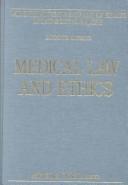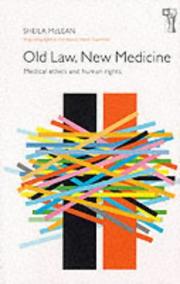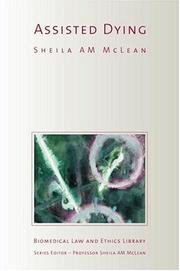| Listing 1 - 10 of 23 | << page >> |
Sort by
|
Book
ISBN: 0333407725 Year: 1988 Publisher: Basingstoke
Abstract | Keywords | Export | Availability | Bookmark
 Loading...
Loading...Choose an application
- Reference Manager
- EndNote
- RefWorks (Direct export to RefWorks)
Law --- Sex discrimination --- Sex discrimination against women --- Discrimination sexuelle --- Discrimination à l'égard des femmes --- Law and legislation --- Droit --- Discrimination à l'égard des femmes

ISBN: 0754620034 9780754620037 Year: 2001 Publisher: Aldershot Ashgate
Abstract | Keywords | Export | Availability | Bookmark
 Loading...
Loading...Choose an application
- Reference Manager
- EndNote
- RefWorks (Direct export to RefWorks)
Medical laws and legislation. --- Medical ethics. --- geïnformeerde vrijwillige toestemming (instemming) --- voortplanting (reproductie) --- experiment, experimenteel onderzoek (mensen) --- levenseinde (einde van het leven, levenseindebeslissing) --- medisch recht (biomedisch recht) --- ethiek (ethische aspecten) --- Medical laws and legislation --- Medical ethics --- #GBIB:CBMER --- Biomedical ethics --- Clinical ethics --- Ethics, Medical --- Health care ethics --- Medical care --- Medicine --- Bioethics --- Professional ethics --- Nursing ethics --- Social medicine --- Law, Medical --- Medical personnel --- Medical registration and examination --- Physicians --- Surgeons --- Medical policy --- Medical jurisprudence --- consentement libre et éclairé --- procréation (reproduction) --- expérimentation sur la personne humaine (chez l'humain) --- fin de vie (décision de fin de vie) --- droit médical (droit biomédical) --- ethique (aspects ethiques) --- Moral and ethical aspects --- Legal status, laws, etc. --- Law and legislation --- Medical law --- Professional ethics. Deontology
Book
ISBN: 0566053934 Year: 1989 Publisher: Aldershot Gower
Abstract | Keywords | Export | Availability | Bookmark
 Loading...
Loading...Choose an application
- Reference Manager
- EndNote
- RefWorks (Direct export to RefWorks)
Ethics, Medical. --- Legislation, Medical. --- Reproductive Techniques. --- Reproduction. --- Human reproduction --- -#GBIB:CBMER --- Human physiology --- Reproduction --- Reproductive health --- Reproductive rights --- Human Reproductive Index --- Human Reproductive Indexes --- Reproductive Period --- Human Reproductive Indices --- Index, Human Reproductive --- Indexes, Human Reproductive --- Indices, Human Reproductive --- Period, Reproductive --- Periods, Reproductive --- Reproductive Index, Human --- Reproductive Indices, Human --- Reproductive Periods --- Reproduction Technics --- Reproduction Techniques --- Reproductive Technologies --- Technology, Reproductive --- Reproductive Technology --- Reproduction Technic --- Reproduction Technique --- Reproductive Technique --- Technic, Reproduction --- Technics, Reproduction --- Technique, Reproduction --- Technique, Reproductive --- Techniques, Reproduction --- Techniques, Reproductive --- Technologies, Reproductive --- Selective Breeding --- Reproductive Medicine --- Reproductive Health Services --- Medical Legislation --- Medicine --- Medical Ethics --- Professionalism --- Bioethics --- Law and legislation --- legislation & jurisprudence --- ethics --- Law and legislation. --- Ethics, Medical --- Legislation, Medical --- Reproductive Techniques --- #GBIB:CBMER --- Sex and law
Book
ISBN: 1138730971 9781138730977 Year: 2018 Publisher: Abington: Routledge,
Abstract | Keywords | Export | Availability | Bookmark
 Loading...
Loading...Choose an application
- Reference Manager
- EndNote
- RefWorks (Direct export to RefWorks)
This title was first published in 2002.The wide range of essays contained within this volume present contemporary thinking on the legal and ethical implications surrounding modern medical practice.

ISBN: 0863584020 Year: 1999 Publisher: London Pandora
Abstract | Keywords | Export | Availability | Bookmark
 Loading...
Loading...Choose an application
- Reference Manager
- EndNote
- RefWorks (Direct export to RefWorks)
General ethics --- Human rights --- Medical law
Book
ISBN: 1855215861 9781855215863 Year: 1996 Publisher: Aldershot Dartmouth
Abstract | Keywords | Export | Availability | Bookmark
 Loading...
Loading...Choose an application
- Reference Manager
- EndNote
- RefWorks (Direct export to RefWorks)
This work presents a range of issues in law, medicine and ethics. Subjects covered include: professional ethics and business ethics; health rights, ethics and justice; refusal of consent to medical treatment of children; sterilization and minors; and maternal/foetal conflict.
Medical law --- General ethics --- Human medicine --- Great Britain --- Medical laws and legislation --- Medical jurisprudence --- Medical ethics --- -Medical jurisprudence --- -Medical laws and legislation --- -#GBIB:CBMER --- gezondheidszorg --- arts-patiëntrelatie --- beroepsethiek (ethische beroepscodes) --- medisch recht (biomedisch recht) --- gezondheidseconomie (gezondheidszorgeconomie) --- transplantatie (orgaantransplantatie, weefseltransplantatie, allocatie van organen, donorschaarste) --- voorafgaande wilsverklaring (voorafgaande negatieve wilsverklaring, levenstestament, euthanasieverklaring) --- Law, Medical --- Medical personnel --- Medical registration and examination --- Medicine --- Physicians --- Surgeons --- Medical policy --- Forensic medicine --- Injuries (Law) --- Jurisprudence, Medical --- Legal medicine --- Forensic sciences --- Biomedical ethics --- Clinical ethics --- Ethics, Medical --- Health care ethics --- Medical care --- Bioethics --- Professional ethics --- Nursing ethics --- Social medicine --- soins de santé --- relation médecin-patient --- éthique professionnelle (code d'éthique) --- droit médical (droit biomédical) --- économie de la santé (économie des soins de santé) --- transplantation (transplantation d'organes, transplantation de tissus humains, greffe d'organes, pénurie d'organes, allocation d'organes) --- testament de vie (directive anticipée) --- Legal status, laws, etc. --- Law and legislation --- Moral and ethical aspects --- #GBIB:CBMER --- Medical laws and legislation - Great Britain. --- Medical jurisprudence - Great Britain. --- Medical ethics - Great Britain.
Book
ISBN: 1855211696 9781855211698 Year: 1993 Publisher: Aldershot Dartmouth
Abstract | Keywords | Export | Availability | Bookmark
 Loading...
Loading...Choose an application
- Reference Manager
- EndNote
- RefWorks (Direct export to RefWorks)
Tort and negligence --- Damages. --- Torts. --- Compensation (Law) --- 347.513 --- Damages --- Torts --- ABB9312 --- 13.01.ZZD --- 13.12 --- Civil wrongs --- Delicts --- Injuries (Law) --- Quasi delicts --- Wrongful acts --- Accident law --- Actions and defenses --- Liability (Law) --- Obligations (Law) --- Negligence --- Reasonable care (Law) --- Measure of damages --- Personal injuries --- Set-off and counterclaim --- Law --- Herstel van schade. Schadevergoeding--(burgerechtelijke aansprakelijkheid --- Wettelijke en contractuele aansprakelijkheid ; Algemeen ; Meerdere landen --- Wettelijke en contractuele aansprakelijkheid ; Geneesheren ; Veeartsen ; Apothekers ; Tandartsen ; Paramedici --- Law and legislation --- Compensation (Law). --- 347.513 Herstel van schade. Schadevergoeding--(burgerechtelijke aansprakelijkheid
Book
ISBN: 9780415473408 9780415473408 9780203873199 9780415473392 9781135219000 9781135219048 9781135219055 0415473403 Year: 2010 Publisher: London Routledge-Cavendish
Abstract | Keywords | Export | Availability | Bookmark
 Loading...
Loading...Choose an application
- Reference Manager
- EndNote
- RefWorks (Direct export to RefWorks)
Autonomy is often said to be the dominant ethical principle in modern bioethics, and it is also important in law. Respect for autonomy is said to underpin the law of consent, which is theoretically designed to protect the right of patients to make decisions based on their own values and for their own reasons. The notion that consent underpins beneficent and lawful medical intervention is deeply rooted in the jurisprudence of countries throughout the world. However, Autonomy, Consent and the Law challenges the relationship between consent rules and autonomy, arguing that the very nature of the legal process inhibits its ability to respect autonomy, specifically in cases where patients argue that their ability to act autonomously has been reduced or denied as a result of the withholding of information which they would have wanted to receive.Sheila McLean further argues that the bioethical debate about the true nature of autonomy – while rich and challenging – has had little if any impact on the law. Using the alleged distinction between the individualistic and the relational models of autonomy as a template, the author proposes that, while it might be assumed that the version ostensibly preferred by law – roughly equivalent to the individualistic model – would be transparently and consistently applied, in fact courts have vacillated between the two to achieve policy-based objectives. This is highlighted by examination of four specific areas of the law which most readily lend themselves to consideration of the application of the autonomy principle: namely refusal of life-sustaining treatment and assisted dying, maternal/foetal issues, genetics and transplantation.This book will be of great interest to scholars of medical law and bioethics.
Medical law --- Professional ethics. Deontology --- Informed consent (Medical law) --- Patients --- Bioethics --- Autonomy (Psychology) --- Legal status, laws, etc --- Philosophy --- Patients - Legal status, laws, etc --- Bioethics - Philosophy --- Droit médical
Book
ISBN: 185521010X 9781855210103 Year: 1989 Publisher: Aldershot Dartmouth
Abstract | Keywords | Export | Availability | Bookmark
 Loading...
Loading...Choose an application
- Reference Manager
- EndNote
- RefWorks (Direct export to RefWorks)
Medical law --- Informed consent (Medical law) --- Informed Consent. --- Legislation, Medical --- Patient Advocacy. --- Legislation, Medical. --- -Consent, Informed --- Consent to treatment --- Disclosure, Medical --- Medical disclosure --- Treatment, Consent to --- Consent (Law) --- Medical ethics --- Medical personnel --- Patient education --- Involuntary treatment --- Patient refusal of treatment --- Clinical Ombudsman --- Patient Ombudsman --- Patient Ombudsmen --- Patient Representatives --- Advocacy, Patient --- Ombudsman, Clinical --- Ombudsman, Patient --- Ombudsmen, Patient --- Patient Representative --- Representative, Patient --- Representatives, Patient --- Commitment of Mentally Ill --- Patient Rights --- Medical Legislation --- Medicine --- Consent, Informed --- Treatment Refusal --- Mental Competency --- Disclosure --- Therapeutic Misconception --- Malpractice --- legislation & jurisprudence --- Great Britain. --- Isle of Man --- United Kingdom --- United Kingdom. --- Great Britain --- -United Kingdom. --- Patient Advocacy --- Informed Consent --- Informed consent (Medical law) - Great Britain. --- Legislation, Medical - Great Britain.

ISBN: 9781844720545 9781844720552 9780203940471 1844720551 1844720543 9781135393021 9781135393069 9781135393076 1135393060 9786611063139 1135393079 1281063134 0203940474 Year: 2007 Publisher: Abingdon Routledge-Cavendish
Abstract | Keywords | Export | Availability | Bookmark
 Loading...
Loading...Choose an application
- Reference Manager
- EndNote
- RefWorks (Direct export to RefWorks)
Assisted Dying explores the law relating to euthanasia and assisted suicide, tracing its development from prohibition through to the laissez faire attitude adopted in a number of countries in the 21st Century. This book provides an in-depth critique of the arguments surrounding legislative control of such practices and particularly looks into the regulatory role of the state. In the classical tradition of libertarianism, the state is generally presumed to have a remit to intervene where an individual's actions, threaten another rather than harm the individuals themselves. This arguably leaving a question mark over the state's determined intervention, in the UK and elsewhere, into the private and highly personal choices of individual to die rather than live. The perceived role of the state in safeguarding the moral values of the community and the need for third party involvement in assisted suicide and euthanasia could be thought to raise these practices to a different level. These considerationsmay be in direct conflict with the so called right to die espoused by some individuals and groups within the community. However this book will argue that the state's interests are and should be second to the interest's that the people themselves have in choosing their own death.
Medical law --- Professional ethics. Deontology --- United States --- Euthanasia --- Right to die --- Euthanasie --- Droit à la mort --- Law and legislation --- Droit --- Droit à la mort --- United States of America
| Listing 1 - 10 of 23 | << page >> |
Sort by
|

 Search
Search Feedback
Feedback About UniCat
About UniCat  Help
Help News
News